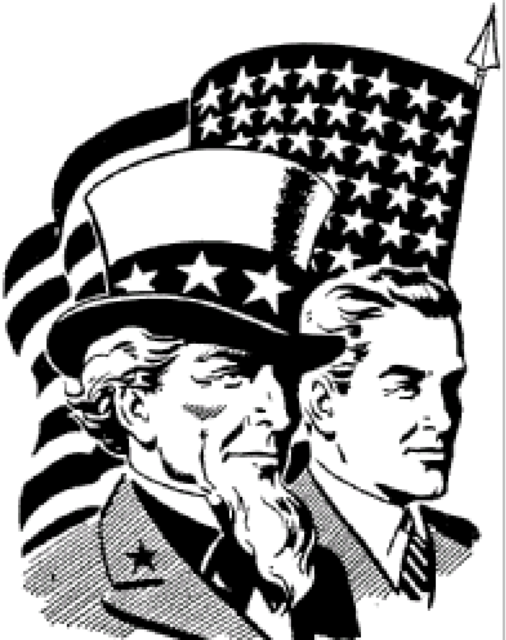Politics and Work:
What Rights Do Employees Have?
federal civil servants can't be discriminated against based
on their political beliefs
Should your politics outside of work affect your status in the office?
Charisse Jones and Michael Izzo, USA TODAY, May 16, 2017
A congressman’s letter that helped push a New Jersey attorney to resign after her boss was told she was a grassroots “ringleader,’’ has sparked questions about how much an employer can clamp down on an employee’s activism.
The Office of Congressional Ethics has been asked to investigate whether U.S. Rep. Rodney Frelinghuysen (R-New Jersey) interfered with the workplace standing of Saily Avelenda, a former senior vice president at Lakeland Bank, when he called out her political activities in a letter to a member of the bank’s board.
In an era of heightened political tensions, when football players have knelt in protest during the national anthem and many Americans are marching and boycotting for perhaps the first time, the case is showing how politics and the workplace can collide.
“There’s no federal law that broadly protects employees’ political expressions at work,’’ says Emily Martin, general counsel and vice president for workplace justice at the National Women’s Law Center. While she says some states offer additional protections, and federal civil servants can't be discriminated against based on their political beliefs, “private employers have a lot of leeway.’’
Still, in practice, while some employers may put limits on overt political activities in the office like tacking a campaign poster to a cubicle wall, what employees do politically in their private lives is generally off limits, says Edward Yost, of the Society for Human Resource Management.
“If they’re marching on the weekends, on one side or the other, those are their rights to do so,’’ he says.
Avelenda was involved with a local grassroots organization, NJ11th For Change, which since November has been demanding that Frelinghuysen hold an in-person town hall with his constituents, something he has not done since 2013.
In March, the congressman sent a signed fundraising letter to a Lakeland Bank board member, Joseph O’Dowd, noting the opposition that he was facing. He also tacked on a handwritten note that read “P.S. One of the ringleaders works in your bank!’’ Attached was a Politico article quoting Avelenda.
Avelenda was later shown the letter by her boss, who told her that Frelinghuysen was a friend of the bank and that she should not use Lakeland’s name when engaging in her political activities, which she says she had not done. Avelenda eventually quit, and while she says the letter was not the only reason, it was a factor.
“When I was shown the letter, I was stunned,’’ Avelenda said.“I didn’t feel pressured when I was told of the letter. I understood they were caught in the middle of this, but I did feel uncomfortable. I wondered why I was being scrutinized.”
Lakeland said in a statement that it does not comment on the status of current or former staff members. But it says that its code of ethics promotes “that each employee has the opportunity to support community activities or the political process in the manner that she or he desires.’’
There could be repercussions for the congressman. The Campaign for Accountability, which calls itself a non-partisan, watchdog organization. filed a complaint with the Office of Congressional Ethics against Frelinghuysen.
“The House ethics committee requires members to act in a way that ‘reflects creditably on the House,’” Campaign for Accountability Executive Director Daniel Stevens said. “If trying to get someone fired for exercising her constitutional right to engage in political activity doesn’t reflect poorly on the House, what does?”
The complaint asks the Office of Congressional Ethics to investigate whether Frelinghuysen interfered with Avelenda’s standing at her workplace, whether he misused his office for the prospect of political gain, and whether he violated the rule requiring members to act in a manner that reflects creditably on the House of Representatives.
And the Democratic Congressional Campaign Committee, which works to get Democrats elected in the House of Representatives, condemned Frelinghuysen’s actions. The DCCC launched a digital ad campaign on Facebook and Instagram Tuesday, targeting voters in Frelinghuysen’s congressional district and using a quote from Avelenda, saying Frelinghuysen used his position to punish her.
“Representative Frelinghuysen abused the power of his office when he targeted his constituent for exercising her First Amendment rights,” DCCC Spokesman Evan Lukaske said. “His unethical actions represent the very worst kind of politics and show exactly why he needs to be replaced next November.”
Frelinghuysen did not respond to repeated calls and emails.
Few workplaces have an official policy governing political activities on the job, though many discourage it, according to SHRM.
A SHRM survey released in June, in the midst of the presidential contest between Donald Trump and Hillary Clinton, found that 72% of human resource professionals said their companies discouraged political activities on the job, 24% had a formal, written policy regarding activism and 8% had an unwritten policy.
Some states or local jurisdictions go beyond federal rules to protect employees' rights to political expression. Washington D.C., for instance, in its human rights code, protects workers from facing bias based on political affiliation, Martin says. The National Labor Relations Act, meanwhile, protects the right of workers to speak in the office about politically charged issues like raising the minimum wage or joining a union which are workplace issues. "But otherwise, under federal law private employers have a lot of leeway in how they run their companies,'' Martin says.
Yost says that “generally speaking, employers may limit the discussion of political candidates at work because oftentimes those debates around fitness for the position may include mention of the gender, race, religion (or) age of the candidate which can be hot button issues.’’
If the company’s staff is gathered for an activity outside of the office, workplace rules about political statements could still apply. “They’re out there as representatives of the company,’’ Yost says,
A workplace’s restrictions may also depend on the job. Managers of a sales team interacting with clients may mandate that employees not walk around wearing campaign buttons. “If you’re working in a back office, it’s likely to be a little more relaxed,’’ Yost says.
But whether or not there’s a hard and fast rule book, employees need to be mindful of the potential fallout declarations about polarizing social issues or politicians could have in their office space.
“Any time you take one of those positions, pro-life, pro-choice, this candidate, that candidate, you can certainly expect that people who don’t share that point of view are likely not going to appreciate it,’’ Yost says. “You may jeopardize their comfort level in working with you in the future which is a detriment to you, to them, and to the organization as a whole.’’
But even though private employers often have latitude when it comes to controlling their employees’ activism, Martin says that they should consider whether stifling their staff’s voices will keep them motivated and engaged. “I would argue that it’s not,’’ she says.
There’s no federal law that broadly protects employees’ political expressions at work. While some states offer additional protections, and federal civil servants can't be discriminated against based on their political beliefs, private employers have a lot of leeway.
72% of human resource professionals said their companies discouraged political activities on the job, 24% had a formal, written policy regarding activism, and 8% had an unwritten policy
The National Labor Relations Act, meanwhile, protects the right of workers to speak in the office about politically charged issues like raising the minimum wage or joining a union which are workplace issues.
The Hatch Act, a federal law passed in 1939, limits certain political activities of federal employees, as well as some state, D.C., and local government employees who work in connection with federally funded programs.
a campaign for Congress to
support civil service
NFFE
National Federation of
Federal Employees
Chicago, IL
We Work for America
Everyday
Please Note: Agencies and employers may have issued separate guidelines for using social media.

